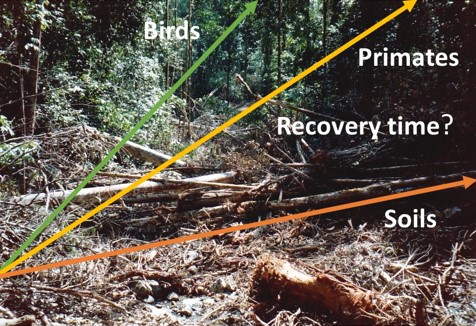Recovery of forest after logging can be tested in many ways: the presence of particular species of fauna or flora, the similarity of the biodiversity of the recovering forest to that on neighbouring areas of undisturbed forest; or the characteristics of soils and streams whose conditions may have drastically changed during logging. Three cases of rainforest recovery after logging and clearance from Australia and Borneo exhibit different starting and different goals for recovery. Faunal indicators of recovery vary with size and with species dependence of the rainforest. Endemic forest species may have difficulty in recovering. Tree species richness and abundance may recover in two decades, but canopy closure takes longer. Compacted soils may retain low infiltration capacities for many decades. This diversity in recovery rates is confirmed when compared with those used elsewhere. Because the starting points for recovery vary, from damage by tropical cyclones and landslides, to clearance for shifting cultivation, pasture or agriculture, to post-logging conditions, universal indicators may be inappropriate. The desired endpoints of recovery also range from a “wilderness” state to a National Park for human enjoyment, biodiversity preservation, safeguarding rights of traditional forest-dwelling peoples, or a second round of selective logging.

